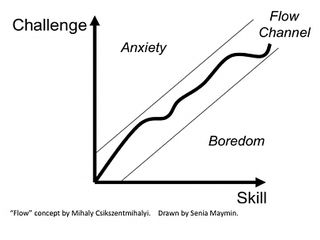Like it or not, we all occasionally get into ruts. We can’t seem to find a way to bring maximum enjoyment to our work, so eventually we get bored. One of the differences between very successful people and the rest of us, is that successful people tend to intuitively follow the rules I’m about to show you, to prevent them from experiencing too much boredom, or too much anxiety.
 For decades, despite hundreds of studies on boredom, not a lot was known about this elusive experience. Then, in the 1960’s and 70’s, a Russian born University of Chicago psychologist stumbled on the answers while studying the internal experiences of successful workers, artists, and climbers.
For decades, despite hundreds of studies on boredom, not a lot was known about this elusive experience. Then, in the 1960’s and 70’s, a Russian born University of Chicago psychologist stumbled on the answers while studying the internal experiences of successful workers, artists, and climbers.
Mihaly Csikszentmihalyi found that for optimal engagement to be experienced, people must find a balance between their level of competence or skill and their level of challenge. If your level of skill is great and your level of challenge is low, you will most certainly experience boredom (see diagram).
Conversely, if your levels of skill and competence are low relative to the height of the challenge, then anxiety will kick in, and you could buckle under the pressure.
Where “optimum engagement” takes place is in the sweet spot between your level of challenge and your skill level. What this means is that we all need to pay close attention to balance between the two, looking for ways that we can increase our challenges as we increase our competence.
So how can we do this? This is much easier to answer when it comes to anxiety than when it comes to boredom. With anxiety, you can adjust in either direction....you can focus your energy on decreasing the level of challenge, or find mentors or training to increase your level of competence...or both.
With boredom, you can only adjust in one direction. Since it's impossible to decrease the skill level, you are left with having to find ways to increase the level of challenge.
Please send in your ideas about how this important balance can be accomplished in a practical manner for realtors or with those who manage them. If I get some concrete tips, I’ll pass them on...
Editor's Note: This article was written by Dr. David Mashburn. Dave is a Clinical and Consulting Psychologist, a Partner at Tidemark, Inc. and a regular contributor to WorkPuzzle. Comments or questions are welcome. If you're an email subscriber, reply to this WorkPuzzle email. If you read the blog directly from the web, you can click the "comments" link below.




Comments